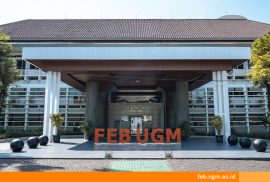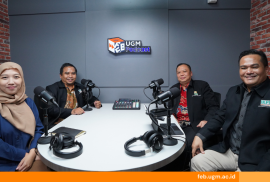Universitas Gadjah Mada (UGM), along with the Indonesia Fintech Society (IFSoc), supported by Grab and OVO held a public lecture webinar and panel discussion on Tuesday (08/03). The public lecture and panel discussion was themed “Heading to G20 Indonesia 2022 Presidency” with a specific topic discussing the “Digitalization of MSMEs: Driving Force for Digital Ecosystems & Democratization of the Indonesian Economy.” The webinar was held online via Zoom Webinar and featured expert speakers from various fields.
The event started with a panel discussion session brought on by Neneng Goenadi, Country Managing Director of Grab Indonesia. During her session, Neneng explained about Grab’s commitment to various initiatives to support the digitization of Indonesia’s MSMEs that took shape towards the recovery of the national economy. Based on the spirit of “Grab for Good,”, Grab Indonesia took the initiative to create features that benefit MSME partners in simplifying their business operations and formed Grab Academy, where both driver-partners and merchants can access hundreds of educative materials such as financial literacy, digital marketing, and others.
The panel discussion continued with the discussion of topics from the next speaker, Hendri Saparini, Ph.D, as the Founder of CORE Indonesia and member of the IFSoc Steering Committee. She emphasized that the topic presented at this event was very important because more than 60% of our economy is supported by MSMEs, so when we talk about economic digitalization, it is certain that MSMEs are the priority for digitization. Hendri said that carrying out the digitization process can help solve various problems faced by MSME actors. This has been proven empirically based on a survey conducted by CORE Indonesia.
Then, the panel discussion was paused for a moment by a public lecture session titled “Post-Pandemic Digital Transformation Momentum,” which was delivered by the Coordinating Minister for the Economy of the Republic of Indonesia, Dr. (H.C.) Ir. Airlangga Hartarto, M.B.A., M.M.T. In his presentation, Airlangga explained the various support initiatives that the government has conducted for MSMEs affected during the Covid-19 pandemic, especially related to funding problems such as the provision of Micro Business Productive Assistance (BPUM) and MSME Credit Guarantee. Meanwhile, more specifically related to strengthening the foundation of MSMEs in the digital economy ecosystem, the government is also trying to create a “Super Smart Society” by balancing services through technology which are able to integrate between cyber and physical space. This is done by seeking synergies from aspects of the marketplace, sharing economy, smart appliances, and e-education (MSME learning).
To represent the financial technology (fintech) perspective, Mirza Adityaswara, as the Chair of the Indonesia Fintech Society, gave a public lecture on the development of the use of digital payment methods by MSMEs. According to him, more than 60% of MSME actors now have implemented digital payment methods for reasons of faster payments and easier transactions. However, Mirza said that there are still some obstacles in implementing digital payments, such as weak network disruptions.
The next panel discussion session featured Karaniya Dharmasaputra, President Director of OVO, who discussed economic democratization efforts done by Grab and OVO by helping MSMEs in expanding access to distribution, increasing customer traffic, conducting marketing activities, and providing promotional budgets (cashback). In addition, Karaniya also discussed the social impact of OVO as a digital payment gateway that has succeeded in boosting MSME transactions so that there is now a daily increase of 70% and as a supporter of economic inclusion that has succeeded in empowering young entrepreneurs and women.
Also present at the panel discussion session was a public figure and owner of Mamahke Jogja Cafe, Zaskia Adya Mecca, who discussed the topic from the perspective of MSME actors. Mamahke has been operating for 5 years and during the Covid-19 pandemic it was severely affected because the majority of Mamahke’s target market were tourists. “Entrepreneurship is how we can be creative when we see a problem as a challenge to be able to get through these obstacles,” she said. Zaskia’s solution was to change Mamahke’s business operations from physical to digital, including implementing digital payments that minimize human error. In addition, Mamahke also underwent an adjustment from the concept of a gift shop to a cafe/restaurant in order to target the local Jogja community market.
At the end of the panel discussion session, Prof. Dr. R. Agus Sartono, MBA, as the Coordinator of the Value Based Finance FEB UGM, explained the material from an academic perspective titled “Campus and MSME Development.” According to him, campuses have the resources to overcome digital literacy problems and accelerate the digital transformation of MSME actors. Currently, the campus is present as a digital talent builder and a provider of human resource needs in the era of the digital economy. In addition, the campus has also been encouraging and shaping students from the start to become entrepreneurs creating job opportunities.
Reportage: Kirana Lalita Pristy.




